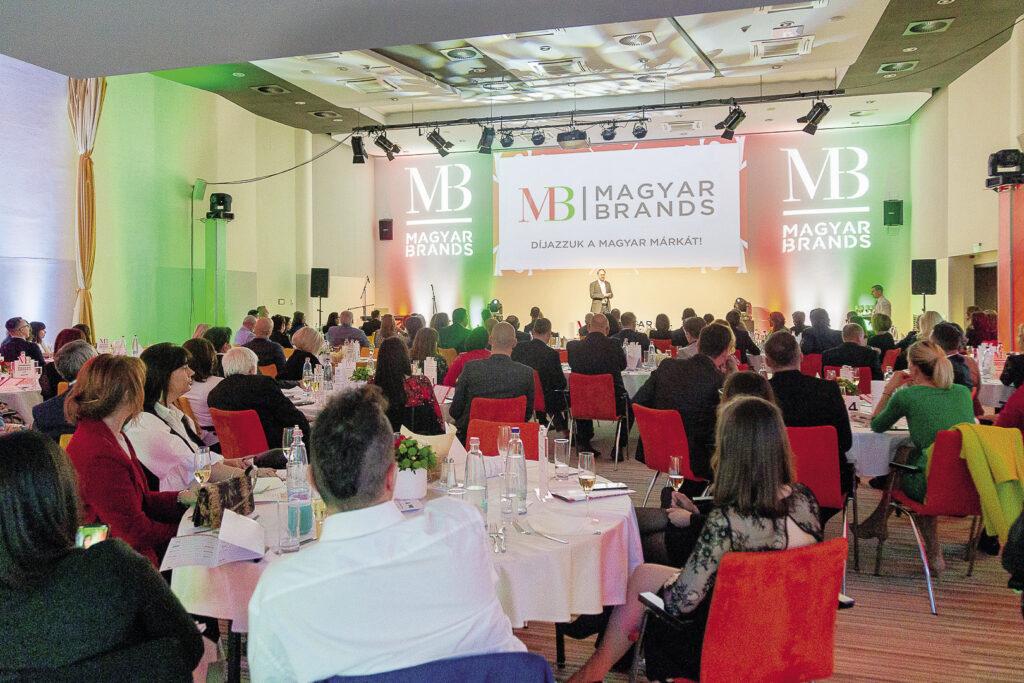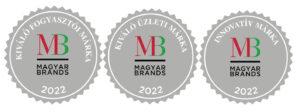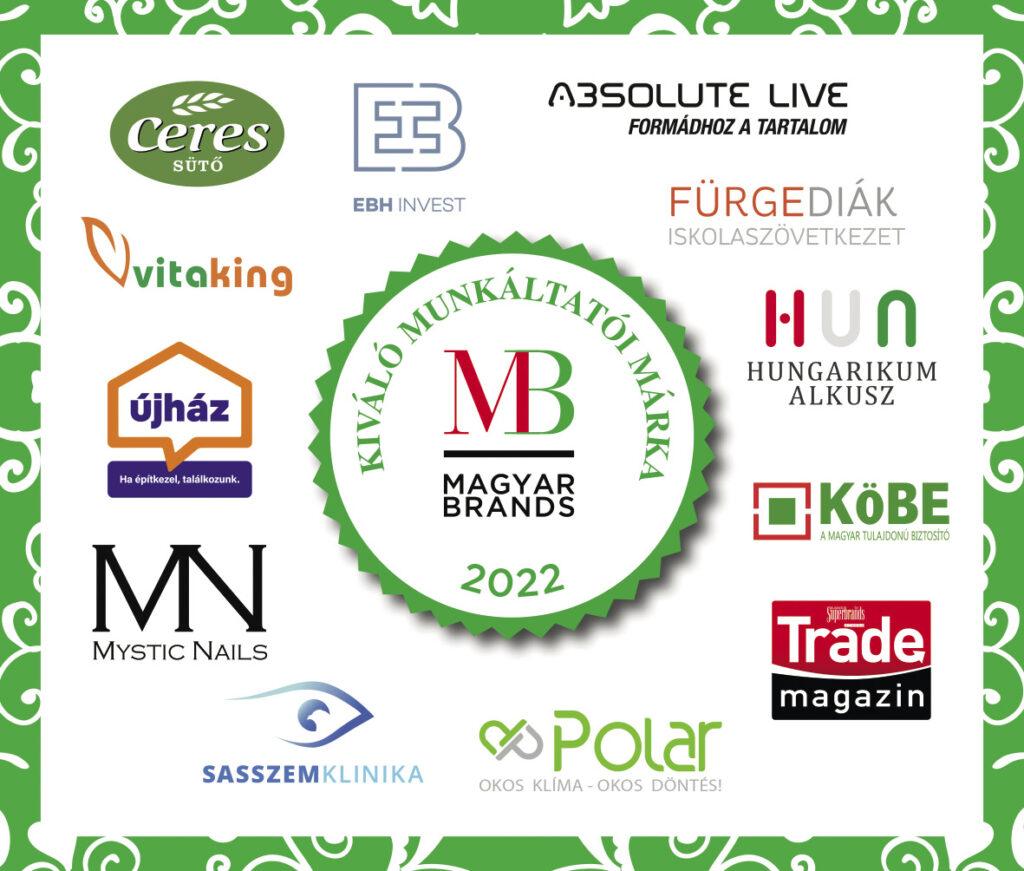Growing trust in Hungarian brands – the MagyarBrands Programme has been offering guidance for 13 years now
The MagyarBrands Programme has been searching for and rewarding exceptional brands for 13 years. MagyarBrands has become a logo that serves as a trademark, guiding consumers in their purchasing decisions, at the same time also drawing attention to the products and services of the best Hungarian consumer, business and innovative brands. Communicating the MagyarBrands recognition can be helpful for brands in their brand building work.

A total of nearly 850 brands have been recognized as Excellent Brands in the 2022 selection process also subject to the assessment by the committees of experts
What makes a brand Hungarian?
Only those Hungarian brands are eligible for taking part in the MagyarBrands Programme which were established in Hungary or created with Hungarian participation. They also need to be in Hungarian ownership, “made” in Hungary or get a high “Hungarian identity” score from the committee of experts. Brands can be rewarded in three categories: consumer brand, business brand and innovative brand. In 2022 about 850 brands earned the Excellent Brand recognition.


Otília Dörnyei
tag
MagyarBrands
committee of experts
According to Otília Dörnyei, a member of the MagyarBrands committee of experts, the programme has stood for reliability and credibility ever since its launch, and these two consumer expectations are also the cornerstones of its brand evaluation system. The average awareness rating of MagyarBrands winners in 2022 was above 70%, and their popularity score exceeded 85%.
The emphasis is on transparent internal communication – Excellent Employer Brand
Those companies can be rewarded with the Excellent Employer Brand award that are winners in any of the three MagyarBrands categories.

Zita Kulcsár
member
Excellent Employer Brand commitee
of experts
Zita Kulcsár, a member of the Excellent Employer Brand committee of experts told: workers became “bullshit-sensitive” during the pandemic, and this is very well reflected by the fact that a large number of companies are using a much more transparent communication now – both internally and externally – than before.
The MagyarBrands Programme continues in 2023, and you can learn about the details on the official website.
www.magyarbrands.hu //

//
Márkaüzenetek válság idején – Zsűrivélemények

Zoltán Fekete
general secretary
Branded Goods Association
What we can see from the Hungarian trends is that firms are under double pressure: from the supply side higher costs, from the demand side diminished purchasing power define their business prospects. In connection with the cost-of-living crisis, innovation work, distribution practices and marketing activities are transforming. Instead of lifestyle and image messages, we can see a growing number of advertisements that communicate functional benefits and price advantages. //
__________________________________________

Zsuzsanna Hermann
owner-MD
Trade magazin
When there is a crisis, it is a mistake to stop the brand building work. A company’s brand has to reflect what the company represents in a crisis situation too. If we want to retain the trust of customers, the core values of the company must be the starting point of every message in our communication. The customer is the most important: we must always take into consideration their needs and viewpoints, putting them in the focal point of the communication strategy. In every crisis there lies the opportunity to be the catalyst for positive changes. //
__________________________________________

Bálint Hinora
managing director
Hinora Group
COVID and economic recession were unable to break the presence of brands, those who believed brand communication was important kept going forward in these years too. We have met several companies for which this period was actually a wake-up call, and they realised that they need to work on their brand, redefining it in terms of brand equity, character or promise. In the present situation those brands can increase the price of products without a big risk that have completed the brand building process. //
________________________________________

Aywee Kőteleky
creative group head
Republic Group
Rising utility costs, growing food inflation – everybody is aware of the current situation. This makes life difficult for brands too, and I think shoppers don’t connect this problem/ the price increase with the brands, but with the economic situation. Even if brands offer better quality or added values, for many consumers lower prices can be more attractive at the moment. Still, my view is that brands shouldn’t stop communicating their benefits, their special characteristics which differentiate them from competitors. //
________________________________________

Zsófia Lakatos
managing director
Emerald Public Relations
We are living in a so-called polycrisis: we must manage several crises at the same time. This is a difficult situation for consumers and brand alike. Making plans isn’t easy at times like these, as brands need to come up with different scenarios and learn to adapt to the constantly changing world. However, valuable brands such as the Magyarbrands winners are able to do this. //
________________________________________

Gabriella Liptay
director of marketing and communications
KPMG
At times of recession and crisis consumers tend to change their buying habits, and obviously this influences brand “behaviour” too. Today a growing number of brands are building on solidarity, responsibility and trust as their core values; they are competing with each other in similar brand positions, and often this takes away their uniqueness. A KPMG study has revealed that these days more and more shoppers find the brand name less important, focusing more on the environmental and social impact of brands. //
_____________________________________

Dr. Bálint Nagy
head of the department of marketing
IBS/The University of
Buckingham
The inflation that started last year has created a somewhat difficult situation, as in the long run purchasing power won’t be able to keep up with the rapidly rising prices, thus a growing proportion of consumers will search for and find new alternatives, or in the worst case they will stop buying certain products. Every brand must react to this situation, e.g. by simplifying packaging, reducing product size, making the product more sophisticated, etc. Meanwhile private label products are pushing forward. This means that Hungarian brands are facing a challenge where they must compete with not only global brands. //
_________________________________________

Dr. János Serényi
owner MD
Értéktrend Consulting
It is beyond question that the recession affects every brand – in most cases negatively. They are trying to find the way out and it is clear that lowering the prices isn’t the only solution. Recently the firm Brand Finance has measured how consumers perceive the sustainability efforts of 4,000 brands in 36 countries. Thanks to this, brand owners have learned how important sustainability is for consumers in making purchasing decisions and recruiting new workers, and what the target group thinks about the sustainability performance of a given brand, in comparison with its competitors. May be it would be a good idea to do this survey in a 37th country as well?! //
_________________________________________

Dr. Gedeon Totth
member of the board,
head of the Agriculture and Food Department,
Hungarian Marketing Association
The general price surge has shocked consumers, and in this situation shoppers are becoming more price-sensitive, starting to prefer cheaper products. It may seem to be a good idea for brand owners to try cutting the marketing costs, which can work in the short term but will backfire afterwards. Fifteen years ago the last recession showed that those brands could retain their market positions which had strong marketing backing! Even if it isn’t easy, companies have to find the way to do efficient marketing. As for product innovation, it depends very much on the given category – how much consumers are involved in the category, and how much they demand new innovations. //
_________________________________________

Dr. László Vass
rector emeritus
Budapest Metropolitan
University
Brands are in a difficult position in the category of essential foods, because shoppers in the large but segmented buyer base react to the present situation very differently. Prize games, price reductions for buying more and point collection schemes are very frequent today, but my view is that this is a rather risky method for diverting consumer attention from growing prices. Today even the less conscious consumers are already calculating how much they can profit from these “games”, and they tend to be disappointed in retailers instead of having more faith in brands. //
Related news
ESG: the majority don’t ask for postponement, preparedness level is increasing
🎧 Hallgasd a cikket: Lejátszás Szünet Folytatás Leállítás Nyelv: Auto…
Read more >Related news
EY Businessman of the Year: Tibor Veres is the grand prize winner, six special awards were also given out
🎧 Hallgasd a cikket: Lejátszás Szünet Folytatás Leállítás Nyelv: Auto…
Read more >








